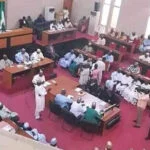The Balm in Gilead Foundation for Sustainable Development (BIGIF) has restated the call for 35 percent affirmative action in political appointments at all levels of governance in Nigeria.
Development Diaries reports that the national average of women’s political participation in Nigeria has remained 6.7 percent in elective and appointive positions.
The number, 6.7, is far below the global average of 22.5 percent, Africa regional average of 23.4 percent and West African sub-regional average of 15 percent.
Nigeria’s National Gender Policy (NGP) recommends at least 35 percent of affirmative action, as the policy seeks the inclusive representation of women with regard to elective and appointive public service positions.
However, adherence to the NGP leaves a lot to be desired; with a gender equality bill seeking legislative framework to empower women for increased participation in politics suffering setbacks since 2016.
BIGIF, a woman-led non-governmental organisation (NGO), believes that with 35 percent affirmative action, Nigeria would be able to get it right on women’s political and administrative rights.
The foundation’s Executive Director, Oluwatumininu Adedeji, made this known during a courtesy visit to Governor Biodun Oyebanji of Ekiti State, southwest Nigeria.
It is understood that the NGO presented a letter titled: ‘Request for 35 percent Affirmative Action in Political Appointments in Ekiti’ to the newly constituted political appointment committee in Ekiti State.
‘For our emerging democracy in Nigeria to be sustainable, all groups within the population must be actively involved in the governance process and their voices must be heard’, Adedeji said.
‘And, their experiences and expertise must be utilised for optimal growth and development of the country.
‘We must rise to break the bias that hitherto limit women’s participation in politics and governance process’.
Nigeria is ranked 181 out of 193 countries on the equality index for countries with low women representation in governance.
Photo source: NAN





